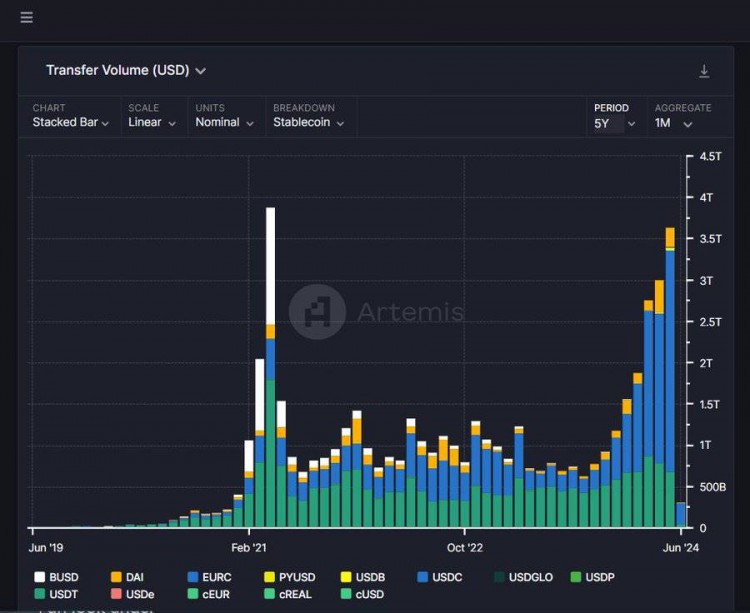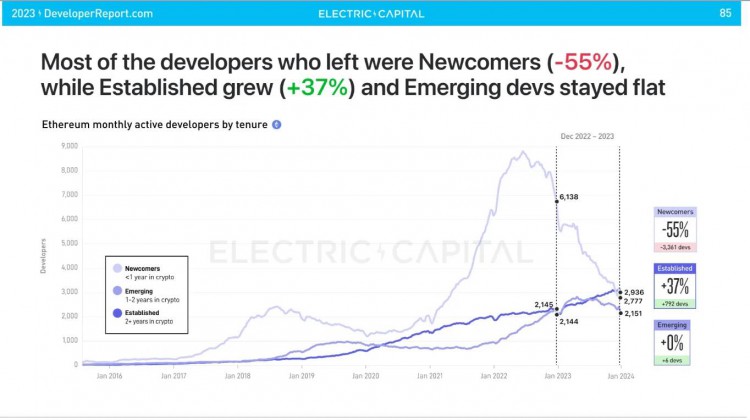摘要:尽管第二次世界大战后女性劳动力参与率有所增加,但第三次和第四次工业革命(两次工业革命的特点是技术越来越多地参与工业和商业流程)对女性的进步也存在同样的玻璃天花板。然而,尽管越来越多的女性进入科技行业,但仍需要做很多工作,因为科技相关职业中的性别差距仍然很明显。...
新兴的加密行业融合了技术和金融——这两个领域传统上由男性主导。
尽管第二次世界大战后女性劳动力参与率有所增加,但第三次和第四次工业革命(两次工业革命的特点是技术越来越多地参与工业和商业流程)对女性的进步也存在同样的玻璃天花板。
21 世纪,人们一直在努力缩小科技行业的性别差距并打破玻璃天花板。然而,尽管越来越多的女性进入科技行业,但仍需要做很多工作,因为科技相关职业中的性别差距仍然很明显。
自比特币( BTC )诞生以来,区块链空间显着扩大,催生了一个全新的行业。Web3 可能为女性提供了参与科技和金融领域下一次革命性飞跃的机会。
然而,女性是否也参与了这场革命,或者 Web3 行业是否遵循与传统金融和技术行业相同的模式?
为什么 Web3 行业的女性参与度较低?
尽管女性进入加密货币领域并做出了显着的贡献,但仍然需要做很多工作。
波士顿咨询集团 (BCG) 2022 年行业分析发现,Web3 创始人中只有 7% 是女性,而在顶级加密初创公司中,27% 的员工是女性。这种性别差异也延伸到了加密货币投资者。
数据清楚地表明Web3行业女性参与度较低,但这背后的原因是什么?
Cointelegraph 询问了 Web3 行业不同领域的几位女性的见解。
互操作性协议 Connext 的联合创始人兼首席执行官 Layne Haber 告诉 Cointelegraph,“最大的障碍之一是缺乏高级导师和榜样。”
她补充说,“高层的代表性非常重要,因为它可以塑造年轻女性如何看待自己未来的可能性。”
To Haber’s point, a 2022 study by Forex Suggest looked into the diversity at several crypto companies and revealed a lack of female role models, with few companies having more than 20% female representation in senior leadership or even one woman on the board.
Recent: DeFi pump-and-dump schemes rake in millions, harm industry credibility
This lack of women in senior roles creates a negative spiral where women feel underrepresented and are less motivated to enter a field, she said.
Margot Paez, a fellow at the Bitcoin Policy Institute and a Bitcoin mining sustainability and environmental consultant, told Cointelegraph she thinks the core fields composing the crypto sector may be the cause for the low participation of women:
“The intersection of technology and finance seems to be a perfect storm.”
The presence of men is very high compared with women in both finance and tech. As the BCG research reveals, women are more present in Web3 projects where social skills are more relevant than technical skills.
Cecilia Hsueh, co-founder and CEO of layer-2 blockchain Morph, told Cointelegraph that the Web3 sector might fall into the same trap as other tech sectors, despite its good intentions:
“Despite the decentralized and inclusive ethos of blockchain technology, disparities in leadership roles, funding and visibility for women remain apparent.”
Hsueh emphasized that “unequal access to funding for female-led startups” doesn’t help motivate female entrepreneurs to enter the field.
In a 2023 op-ed, Mariana Krym, the chief operating officer of Vyvo Smart Chain, wrote that out of all Web3 companies that raised more than $100 million, there were no projects with all-female founding teams.
Catie Romero-Finger, the co-founder of Web3 marketing agency Babs, told Cointelegraph that women find it difficult to enter the Web3 space because of its ambiguity.
She said that Web3 isn’t easy to study as a consolidated career; it requires a leap of faith by getting one’s hands dirty and figuring out the path as it goes.
Romero-Finger believes that the uncertainty may be “intimidating for women.” In her opinion, men tend to be comfortable trying something new, even in the face of failure, while women don’t. As she said:
“We don’t talk ourselves up like men or are willing to take as many risks because we simply feel, and maybe we are, called out more often if we fail.”
Sandy Carter, chief operating officer of Unstoppable Domains, agrees with this idea of there being a fear of failure, telling Cointelegraph that women tend to wait to be fully confident to step into a new space.
A 2013 internal Hewlett Packard report reportedly found that women tend to apply for a job once they meet all the requirements, while men will apply if they meet roughly 60% of the conditions.
Carter believes women should dare to take more risks to be able to step into the game, despite not feeling completely prepared.
Discrimination and “bro culture” in the Web3 industry
All the women with whom Cointelegraph spoke could immediately provide incidents in which they felt discriminated against for being women.
Haber mentioned that during her first conference, nobody believed she had technical expertise. “People kept quizzing me about our codebase and my contributions to it.” Similarly, Hsueh felt “challenged to secure funding,” as she “was not taken seriously in technical discussions.”
Romero-Finger mentioned that despite being the founder of her own company, one client would only work with a male executive with whom he was close at her company. Ultimately, she “was forced to take a step back” and let her male team member deal with the client.
Paez highlighted how women tend to receive “more sexualized hate and trolling on social media.”
Carter said she got more attention while posting about tech-related topics on social media under a man’s name.
She also recalls how a bank executive would only speak with her male boss even when she was brought into the meeting as an expert. The situation was so awkward that her boss acted like he was sick and left the meeting abruptly, forcing the banker to talk directly with Carter.
The crypto industry has been accused of having a “bro” culture, and incidents such as the 2018 American Bitcoin Conference ending its event at a strip club haven’t helped.
While the industry has evolved since then, has the culture changed into a more inclusive one?
Romero-Finger believes the industry is still “very bro-focused.” In her experience, she has noticed how her women-led firm benefits when the third partner of her company, a man, is on the call.
In Carter’s opinion, the bro culture is especially hostile to women trying to learn more about the Web3 space, as it’s not open to people asking questions. As a result, she started Unstoppable Women to provide a safe space where women can learn about the Web3 industry.
Solutions for women to enter Web3 and break the glass ceiling
While it’s clear that there is a glass ceiling, things may be changing.
Web3 is still a very young industry that has yet to consolidate. The novelty of the industry offers an opportunity for women to establish themselves at top-ranking levels.
Recent: Energy-efficient miners in US less likely to be impacted by Bitcoin halving
Haber sees an “enormous amount of potential for women to shape their leadership trajectories.” However, women shouldn’t wait too long, otherwise it could become a male-dominated sector with a solidified glass ceiling. Romero-Finger called out to encourage women to step in:
“We are all learning here, so there is no imposter syndrome. It is a great opportunity to dive in, and women need to learn to dive in more!”
Hsueh 表示,获得更多关注和支持的一些最有用的方法包括“女性主导的区块链教育计划、社交活动和有针对性的奖学金等举措”,她认为宣传成功女性的故事可以鼓励和激励其他人加入并参与其中。在 Web3 领域进行创新。




